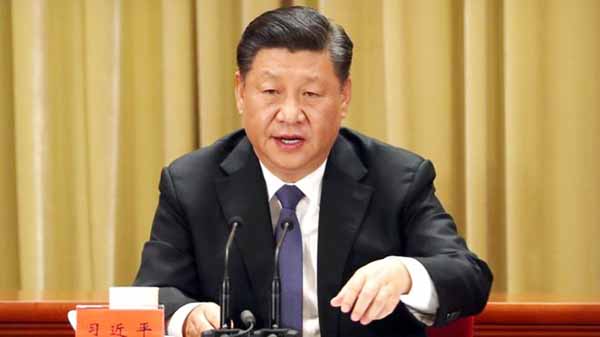
AFP, Beijing :
China will not give up the use of military force as an option to ensure the reunification of Taiwan, President Xi Jinping said Wednesday, while insisting the island would ultimately be reunified with the mainland.
Beijing “reserves the option of taking all necessary measures” against outside forces that interfere with peaceful reunification and Taiwan independence separatist activities, he said.
In a speech commemorating the 40th anniversary of a message sent to Taiwan in 1979, in which Beijing called for unification and an end to military confrontation, Xi described unification under a “one country, two systems” approach that would “safeguard the interests and well-being of Taiwanese compatriots”. China still sees Taiwan as part of its territory to be reunified, despite the two sides being ruled separately since the end of a civil war on the mainland in 1949.
Taiwan considers itself a sovereign state, with its own currency, political and judicial systems, but has never declared formal independence from the mainland.
Taiwan considers itself a sovereign state, with its own currency, political and judicial systems, but has never declared formal independence from the mainland.
Relations have been strained for the past two years since the election of President Tsai Ing-wen, who has refused to acknowledge Beijing’s stance that the island is part of “one China”.
On Tuesday, Tsai warned Beijing that Taiwan’s people would never give up the kind of freedoms unseen on the authoritarian mainland. Beijing “must respect the insistence of 23 million people for freedom and democracy” and “must use peaceful and equal terms to handle our differences”, she said.
Last October, tens of thousands of Taiwan independence campaigners took to the streets in the first large-scale protest calling for an outright independence vote since the island first became a democracy more than 20 years ago.
But some in Taiwan say worsening relations with Beijing have harmed business, as cuts to pensions and a reduction in public holidays have compounded frustrations over a stagnant economy where salaries have not kept up with the rise in cost of living.
Last year, Taiwan’s ruling party suffered a massive defeat in mid-term polls, causing Tsai to resign as leader of the ruling Democratic Progressive Party, while the main opposition Kuomintang, which oversaw an unprecedented thaw with Beijing before Tsai took office in 2016, made gains.
Beijing has made a multi-pronged attack to erase Taiwan from the international stage in recent years, including blocking it from global forums and poaching its dwindling number of official diplomatic allies.
China has also successfully pressured global firms to list Taiwan as part of China on their company websites.
BBC adds:One day ahead of Mr Xi’s speech, Taiwan’s president Tsai Ing-wen said Beijing should accept the existence of Taiwan and use peaceful means to resolve its differences.
“I would like to call on China to face squarely the reality of the existence of the Republic of China on Taiwan,” Ms Tsai said, referring to the island’s formal name.
China should “respect the insistence of 23 million people on freedom and democracy, and must use peaceful, on parity means to handle our differences”, she added.
In November, Ms Tsai’s political party saw a heavy setback in regional elections perceived by Beijing as a blow to her separatist stance.
Why is this so contentious?
Taiwan is a self-governed democracy and for all practical purposes has acted as an independent nation since 1949, when China’s nationalist government was defeated by communist forces and fled there from the mainland.
China however considers the island to be a breakaway province – not a country in its own right – which will one day be fully reunited with the mainland.
In recent years, Beijing has become increasingly assertive over its claims and what it says is a key question of national sovereignty.

